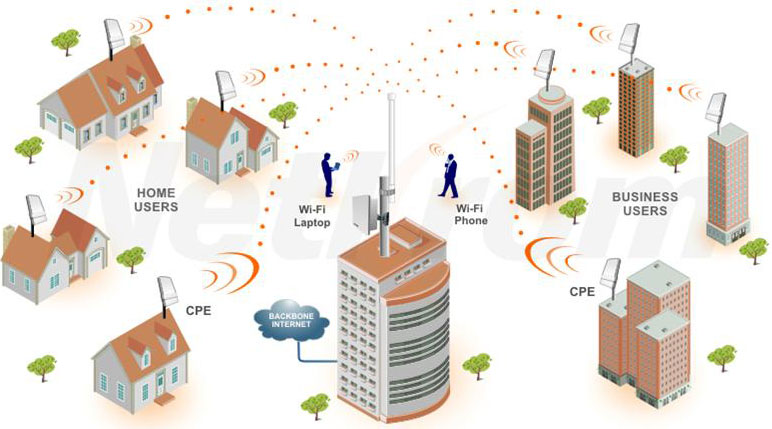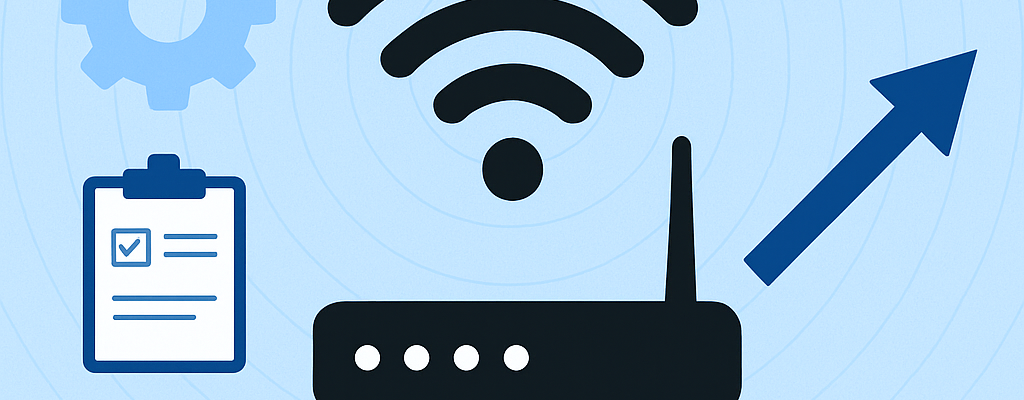The demand for reliable, high-speed internet in Nigeria is greater than ever. Many homes, offices, institutions and estates are frustrated with slow speeds or frequent downtime. If you’re looking to capitalise on this need, setting up a WiFi Internet Service Provider (WISP) can be lucrative, but success depends on having the right technical, business, and customer plans in place.

What a WiFi / WISP Business Setup Involves
Here are the key steps and components you’ll need to address:
-
Feasibility Study & Site Survey
Before installing anything, survey the location(s). Check line-of-sight, geography, interference sources, existing infrastructure (towers, power, fiber), and demand. This helps you decide where to place access points, the kind of equipment needed, and what speed tiers are realistic. -
Regulatory / Licensing & Legal Compliance
You’ll need to understand licensing requirements, spectrum usage (if using wireless point-to-point or backhaul), right-of-way, safety, and regulatory compliance (NCC, local laws). Also ensure you meet any data protection or local telecom rules. -
Network Design & Core Infrastructure
-
Backhaul connectivity (fiber or microwave link)
-
Core routers, switches
-
Wireless access points or base stations for coverage
-
Power planning (UPS, generators or solar where needed)
-
Redundancy and good quality of service (QoS)
-
-
Customer Access & Management Systems
You’ll need a system to manage subscribers: authenticate users, manage bandwidth, generate vouchers/subscriptions, manage payments, monitor usage, deal with support. -
Pricing Strategy & Business Model
Develop packages based on number of subscribers, upload/download speeds, geographic area, peak usage. Factor in capital expenses (CAPEX) and ongoing costs (OPEX): equipment, maintenance, staff, power, internet backhaul, customer support. -
Installation, Testing & Training
Once everything is purchased, install hardware, test performance, configure the network, captive portals if required, train staff for customer onboarding and technical support. -
Marketing & Customer Acquisition
To grow, you’ll need good marketing, excellent customer service, local presence or visibility. Reliability and speed are big selling points. -
Support & Maintenance
Ongoing monitoring, quick response to outages, regular maintenance of wireless hardware, upgrades, ensuring scalability.
Why It’s a Strong Opportunity
-
Big market gap: Many people use only mobile data because home broadband is unreliable or expensive. If you can offer affordable, reliable service, many will switch. (As Guage Concepts has observed, performance and cost are the top complaints.) guageconcept.com.ng
-
Growing devices: Smartphones remain the primary internet device for many. Areas with high density of mobile users (estates, densely populated suburbs) are strong targets.
-
Recurring revenue: Subscribers paying monthly or annually provide stable cash flow once set up.
Sample Business Setup Packages (for Nigeria) by Guage Concepts
Based on our research and experience, Guage Concepts offers different tiers depending on scale. Here are illustrative package types:
| Package | Subscribers | Estimated Setup Cost | Estimated Monthly Revenue |
|---|---|---|---|
| Small (20-50 subs) | 20 – 50 | ₦750,000 | ₦50,000 – ₦125,000 guageconcept.com.ng |
| Medium (100-150 subs) | 100 – 150 | ₦1,500,000 | ₦250,000 – ₦375,000 |
| Large (200-300 subs) | 200 – 300 | ₦3,500,000 | ₦500,000 – ₦750,000 |
| Enterprise (400-600 subs) | 400 – 600 | ₦5,500,000 | ₦1,000,000 – ₦1,500,000 |
| Mega (700-1000 subs) | 700 – 1000 | ₦6,500,000 | ₦1,750,000 – ₦2,500,000 |
These numbers are indicative. Your actual cost will depend heavily on location, backhaul options, spectrum or licensing, etc.
How Guage Concepts Can Help You Build It Right
At Guage Concepts, we bring both technical expertise and business support to ensure your WISP venture is viable, scalable, and profitable. Here’s what we offer:
-
Site Surveys & Feasibility Reports — We visit your site(s), assess demand, check infrastructure, and deliver a technical & cost-feasibility analysis.
-
Network Design & Implementation — From core routers, fiber / microwave backhauls, radios / base stations, access points, to power/backups.
-
Subscriber Management Systems — We configure captive portals, voucher systems, user-bandwidth control, subscription management.
-
Training & Support — Training your technical team, setting up monitoring alerts, and providing ongoing maintenance support.
-
Business & Pricing Strategy — Help you set packages that cover your costs, attract customers, and scale.
-
Marketing & Customer Acquisition — Supporting launch promotions, local marketing advice, and retention strategies.
What You Should Know Before You Start
-
Initial capital can be high depending on area and scale.
-
Power supply & backups often overlooked—these add cost but are vital.
-
Backhaul (connection to main internet lines) must be reliable. If it’s poor or too costly, your service suffers.
-
Regulatory & licensing issues must be handled early to avoid disruptions.
-
Customer service quality often makes or breaks ISPs—downtime or bad support drives customers away.
Conclusion
Starting a WiFi ISP business in Nigeria is not just possible—it’s promising, especially in underserviced areas. With the right plan, solid execution, and a partner that understands tech + business like Guage Concepts, you can build a dependable, profitable ISP.
If you’re ready to explore further, Guage Concepts can prepare a custom proposal including your location, estimated subscriber numbers, all costs, and revenue projections. Let’s build your ISP success story together.


Leave A Comment